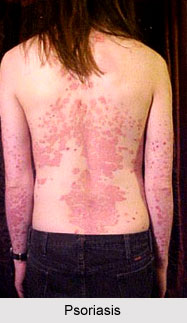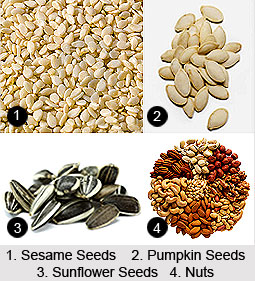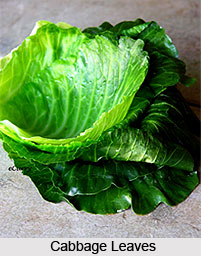 Psoriasis is a chronic disease characterised by thick, red, silvery, scaled patches of skin, affecting both sexes equally and usually first appears at the age ranging from 15 to 30 years. It is, however, rare in infancy and old age.
Psoriasis is a chronic disease characterised by thick, red, silvery, scaled patches of skin, affecting both sexes equally and usually first appears at the age ranging from 15 to 30 years. It is, however, rare in infancy and old age.
Symptoms of Psoriasis:
Plaque psoriasis is the most common type of psoriasis and the skin of the person suffering from this disorder appears red and irritated and at times covered with bright silvery scales, due to which the patient also suffers itching. Areas usually involved are elbows, knees and the skin behind the ears, trunk and scalp. This disease also affects the underarms and the genital areas. The lesions vary in size from minute papules only just visible, to sheets covering large parts of the body. Quite often, they are discs from 1.5 cm. to several centimeters in size. The lesions of psoriasis are always dry and rarely become infected.
Causes of Psoriasis:
The exact cause of psoriasis is not known, however, psoriasis involves an abnormality in the mechanism in which the skin grows and replaces itself. This abnormality is related to the metabolism of amino acids, the protein chemicals, which are nature`s basic building blocks for the reproduction of cell tissues. Heredity also plays a role in the development of psoriasis, as it tends to occur in families. About 30 per cent of the patients have a family history of the disease.
The factors that aggravate and precipitate the outbreak of psoriasis are: injury to the skin in the form of cuts, burns, minor abrasions, changes in the seasons, physical and emotional stress, infections and use of certain medicines for the treatment of other diseases.
Treatment of Psoriasis by Nature Cure:
Diet:
 Since psoriasis is a metabolic disease, a cleansing juice fast for about seven days is always desirable in the beginning of treatment. Carrots, beets, cucumbers and grapes may be used for juices. The warm water enema should be used daily to cleanse the bowels during the fast. After the juice fast, the patient should adopt the diet of three basic food groups, namely (i) seeds, nuts and grains, (ii) vegetables and (iii) fruits, with emphasis on raw seeds and nuts, especially sesame seeds, pumpkin seeds, sunflower seeds and plenty of organically grown raw vegetables and fruits.
Since psoriasis is a metabolic disease, a cleansing juice fast for about seven days is always desirable in the beginning of treatment. Carrots, beets, cucumbers and grapes may be used for juices. The warm water enema should be used daily to cleanse the bowels during the fast. After the juice fast, the patient should adopt the diet of three basic food groups, namely (i) seeds, nuts and grains, (ii) vegetables and (iii) fruits, with emphasis on raw seeds and nuts, especially sesame seeds, pumpkin seeds, sunflower seeds and plenty of organically grown raw vegetables and fruits.
However, the juices of citrus fruits should be avoided in this diet and even all-animal fats, including milk, butter and eggs should be avoided. Refined or processed foods and foods containing hydrogenated fats or white sugar, all condiments, tea and coffee should also be avoided. After noticeable improvement, goat`s milk, yogurt and home made cottage cheese may be added to the diet. Juice fast may be repeated after four weeks of diet.
Water Treatments:
The patient must avoid frequent baths and soaps should also not be used. Regular seawater baths and the application of seawater externally over the affected parts once a day is beneficial. The hot Epsom salts bath has proved valuable in psoriasis. Three full baths should be taken weekly until the trouble begins to subside. The number of baths thereafter may be reduced to two weekly and finally to one. After the bath, a little olive oil may be applied. The skin should be kept absolutely clean by daily dry friction or sponge.
The use of mudpacks in the treatment of psoriasis has also been found highly beneficial. The packs are made by mixing the clay with a little water and are then applied to the affected areas. After the clay has dried, it is removed and fresh pack applied mudpacks are eliminative in their action. They absorb and remove the toxins from the diseased areas.
Solar Treatment:
In many cases, psoriasis responds well to sunlight. The affected parts should be frequently exposed to the sun. The daily use of a sunlamp or ultra-violet light is also beneficial.
Home Remedies:
Cabbage leaves have been successfully used in the form of compresses in the treatment of psoriasis. The thickest and greenest outer leaves are most effective for use as compresses. They should be thoroughly washed in warm water and dried with a towel. The leaves should be made flat, soft and smooth by rolling them with a rolling pin after removing the thick veins.They should be warmed and then applied smoothly to the affected part in an overlapping manner. A pad of soft woolen cloth should be put over it. The whole compress should then be secured with an elastic bandage.
 Exercises:
Exercises:
The patient should undertake plenty of regular exercise in fresh air, especially exposing the affected parts, and deep breathing exercises. He should avoid all nervous tension and should have adequate rest.
Treatment of Psoriasis by Aromatherapy:
Essential oils are excellent skin-soothers and healers and can help calm many of the symptoms, particularly inflammation, itchiness and infection.
Soothing and anti inflammatory Oils: Birch, Bergamot, Cedarwood, Chamomile, Cypress & Violet.
Oils with healing effects: Lavender, Geranium & Myrrh.




